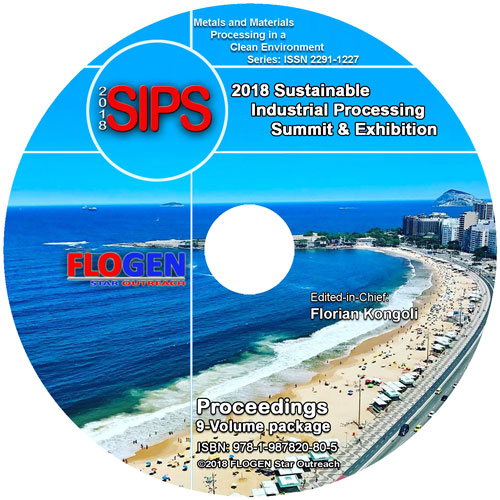2018-Sustainable Industrial Processing Summit
SIPS2018 Volume 7. Non-ferrous / Mineral Processing / Environmental Protection
| Editors: | F. Kongoli, Z. Wang, T. Okura, E. Souza, A. C. Silva |
| Publisher: | Flogen Star OUTREACH |
| Publication date: | 23 December 2018 |
| Pages: | 256 pages |
| ISBN: | 978-1-987820-94-2 |
| ISSN: | 2291-1227 (Metals and Materials Processing in a Clean Environment Series) |

CD shopping page
The Challenges of Artisanal Mining of Kaolin in Junco do Serido, Paraiba, Brazil - Social, Environmental Implications and Small Miner's Health
Francisco Souza1; Joelson Souza Isidro dos Santos1; Antonio Sobrinho2;1FEDERAL INSTITUTE OF EDUCATION, SCIENCE AND TECHNOLOGY OF PARAIBA, Campina Grande, Brazil; 2PRIEST JERONIMO LAWEN SCHOOL, Santa Luzia, Brazil;
Type of Paper: Regular
Id Paper: 115
Topic: 5
Abstract:
The Northeast of Brazil, essentially in the Borborema Province [1], have small-scale mining as a secular activity, promoting livelihood and economic development of cities with mining vocation [2][3]. Junco do Seridó is a town located in the Brazilian State of Paraiba, with privileged rich geology in pegmatite fesdspatic bodies with low iron levels, fastened in quartzites of the Equador Formation. The chemical weathering in acidic conditions [4] in the region promoted degradation of pegmatites, turning feldspars and other silicates in kaolinite with impurities of quartz, muscovite, iron oxides-hydroxides, tantalite and several clay minerals. The kaolin is drawn by hand, initially in open pit front. With the advancement of depth, the mining evolves underground, always handmade, rustic, dangerous, and unhealthy. The goal of this study is to show how the artisanal mining of kaolin influences livelihoods and promotes the economic development of the municipality, but on the other hand causes environmental impact and serious damage to the health of miners. The precariousness of working conditions associated with the lack of surveillance, mining planning of technological innovation, and the absence of recovery projects of degraded areas, altogether cause a mismatch between economic development, social welfare, occupational health, and environmental balance in small-scale mining.
Keywords:
Degradation; Mineral; Ore; Rock; Small-scale mining; Pegmatites; Kaolinite; Environmental impact; Health; Occupational safety;References:
[1] F.F.M. de Almeida. Evolução da Plataforma Brasileira. Rio de Janeiro: DGM (1967) p. 36[2] F.A. Souza, P.S.S. Barros, A.P.C.L. Sobrinho. Open Pit and Undergound Mining: A Mixed Method for Small Mineral Exploration on Pegmatitie Bodies of Central Borborema Province, in Paraiba State, Brazil. Sustainable Industrial Processing Summit/Schechtmam International Symposium. Volume 1: Mining. Edited by Florian Kongoli (2014) 395-401.
[3] F.A. Souza, P.S.S. Barros, A.P.C.L. Sobrinho. Mining and Mineral Processing on Pegmatities: Example of Serido Microregion, Paraiba State Brazil. Sustainable Industrial Processing Summit/Schechtmam International Symposium. Volume 2: Mineral Processing. Edited by Florian Kongoli (2014) 287-296.
[4) W.A. Deer, R.A. Rowie, J. Zussman. Na Introduction to the Rock Forming Minerals. Longmans Green and Co. Ltd. London. 1966. p. 558